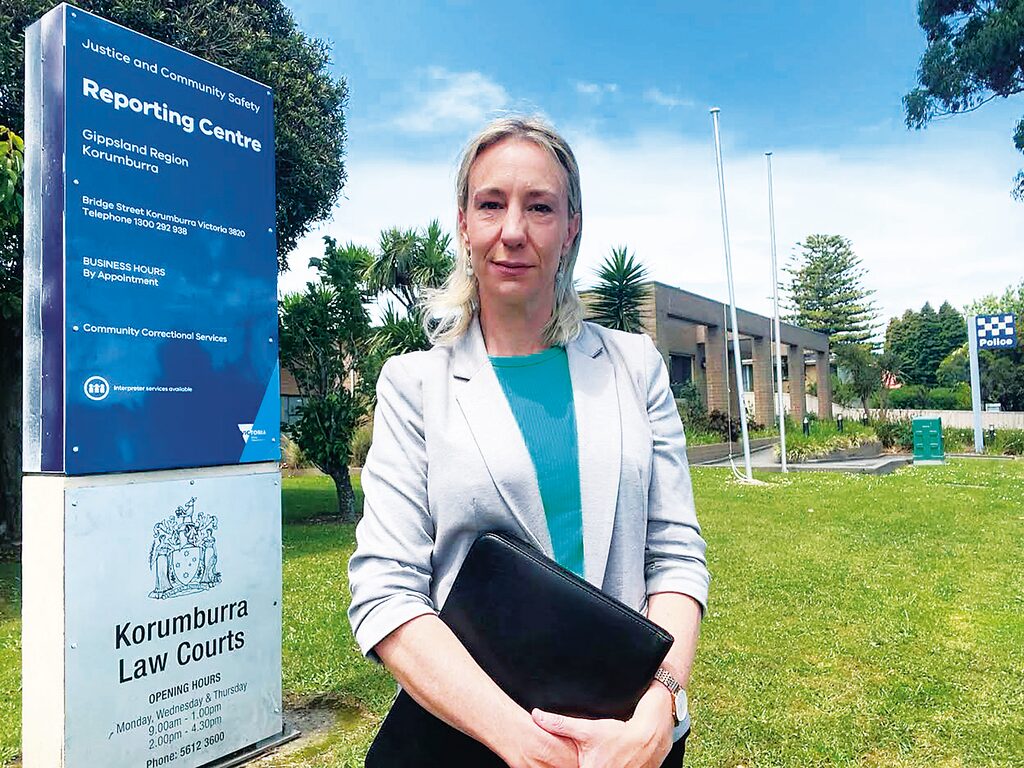STAFF WRITERS
DEB Leonard, who ran for Monash in the previous federal election as an Independent, took part in 16 Days of Activism last year.
The campaign runs each year, starting on International Day for the Elimination of Violence Against Women.
A trained solicitor, Ms Leonard said issues of family violence were an unfortunate reality for Gippsland.
“Gippsland has some of the highest rates of family violence in the country”, Ms Leonard said.
“However, we have far less resources and support networks to address both prevention and responding to family violence than city areas do.
“Fortunately, our local Magistrates Courts and Police take family violence very seriously.”
If police are called out to an incident where they believe there has been family violence, they will often apply for an intervention order on behalf of the alleged victim (referred to in intervention orders as the ‘Affected Family Member’, or AFM). This alleviates the stress that may be placed on the AFM in the process.
However, any person who has been a victim of family violence, or who believes they may be at risk of family violence, can go to the Magistrates Court and apply for an intervention order.
Depending on the allegations, the Court may grant an intervention order immediately upon an AFM making an application. They will then be given a court date and notice of the application will be served by the police onto the alleged perpetrator (called the respondent).
Family Violence includes not just physical violence, but also emotional or psychological abuse, financial abuse, controlling or coercive behaviour, or exposing a child to any kind of violent behaviours.
While it’s important to get individual legal advice, Ms Leonard said there are basically three options for someone who’s had an intervention order application served on them.
Firstly, if the matter is relatively low level, they can enter into an ‘Undertaking’, which is a written promise to the Court not to do any of those things that would be prohibited by the order. This can only be done if all other parties agree.
Secondly, they can consent to the Order against them without admitting the allegations. In that case, they’re agreeing not to commit family violence or do anything else set out in the intervention order, but they’re not admitting any wrongdoing.
The third option is to contest the order. The matter will be adjourned for a procedural hearing, called a direction hearing, and then booked in for contested hearing at a later date, which is when the court will hear evidence from witnesses. This can often take several months due to backlog in the court system.
At a contested hearing, the Court will make sure that both the AFM and the respondent are represented to protect against the AFM being cross examined directly by the respondent.
The Court will then make a decision on the balance of probabilities, whether there are grounds for an intervention order. It’s important to note that the balance of probabilities is a far lower threshold than the criminal threshold which requires proof “beyond reasonable doubt”.
An intervention order is a civil order and doesn’t appear on any criminal record. After the expiration of the order, it will go away.
Breaching the conditions of an Intervention Order can result in a criminal charge, which can result in a penalty of up to two years in prison (in addition to any sentence for any violent behaviour that breached the order).
Ms Leonard said anyone found charged with breaching an intervention order should take the matter very seriously and seek legal advice as soon as possible.
Ms Leonard often appears as Duty Lawyer at the Korumburra Magistrates Court, providing free legal assistance to people on Court matters when they don’t have their own representation.
The Duty Lawyer scheme is coordinated by Victoria Legal Aid in Morwell and many local solicitors participate.












